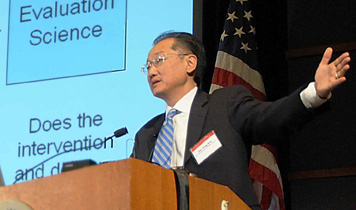NIH explores implementation research
January - February, 2009 | Volume 8, Issue 1

Dr. Jim Yong Kim, a member of Fogarty's advisory board, stresses the
need for implementation resarch in global health at a trans-NIH conference.
Adopting new evidence-based clinical practices and adapting them to different countries requires careful planning and adjustment of existing models to local conditions, say experts in behavior change.
At the recent NIH conference on dissemination and implementation, which drew researchers from around the globe, Fogarty sponsored a session on how to apply effective change models in clinical care.
Using as a case study the Fogarty co-sponsored landmark research of panelists Dr. José Belizán of Argentina and Dr. Marci K. Campbell of the University of North Carolina that drastically improved maternal childbirth outcomes, participants in the breakout session identified barriers to effective “diffusion of innovation.”
They also agreed that the concept of “best practice” ought to be thought of, instead, in terms of “most appropriate practice,” especially when there is no standard of comparing different methods.
Dr. James Dearing of the Institute for Health Research at Kaiser Permanente Colorado said his experience indicates that in getting clinicians to change their practices, the key factors are cost and simplicity—not evidence.
Existing models of change need revision to take into account which technologies exist for preparing for and then communicating change, identifying and reaching medical opinion leaders and determining which path is more cost-effective, participants agreed.
In a passionate keynote address to the entire conference, Fogarty Advisory Board member and Harvard professor Dr. Jim Yong Kim, called for creation of a National Institute of Health Care Delivery and suggested borrowing principles from business and engineering schools.
“Not investing in quality research, in systems research, in delivery research and implementation research is crazy,” given a projected doubling of U.S. health care costs in the next eight years, Kim said.
“Why could you not invest $30 billion if you can then attract the best and brightest … to this fantastic new field of implementation research so we can figure out what works and what does not.”
To view Adobe PDF files,
download current, free accessible plug-ins from Adobe's website.